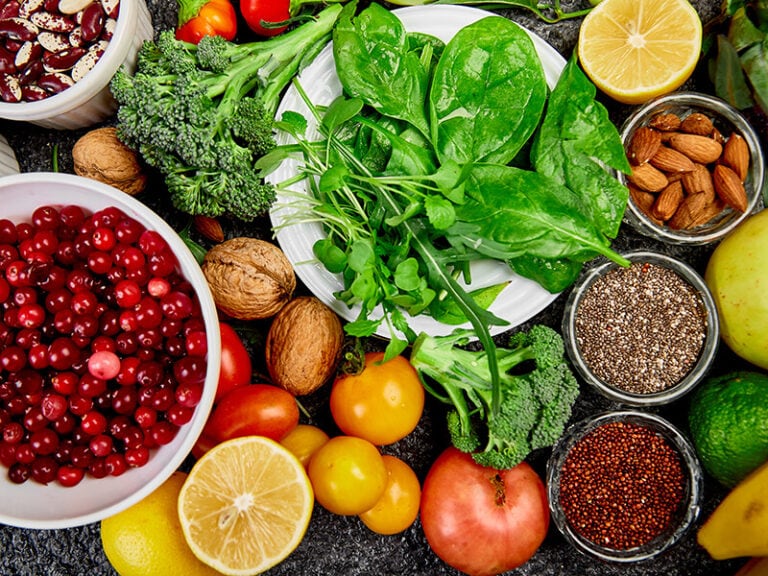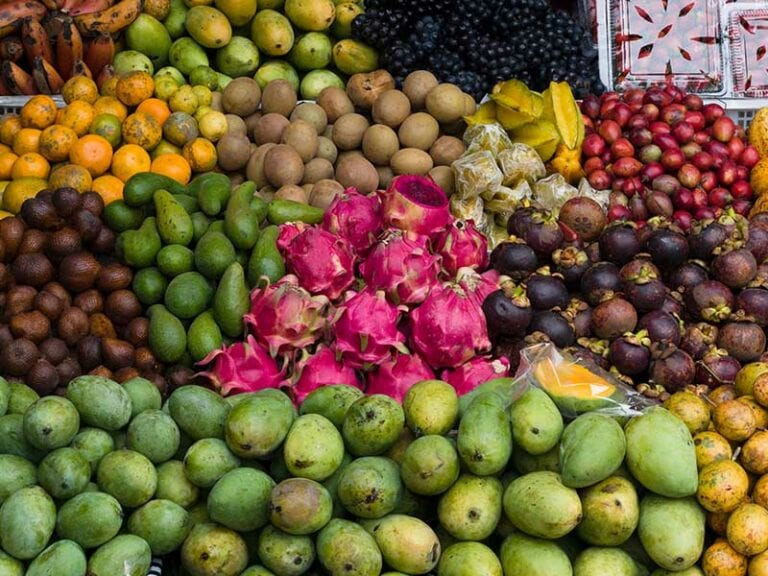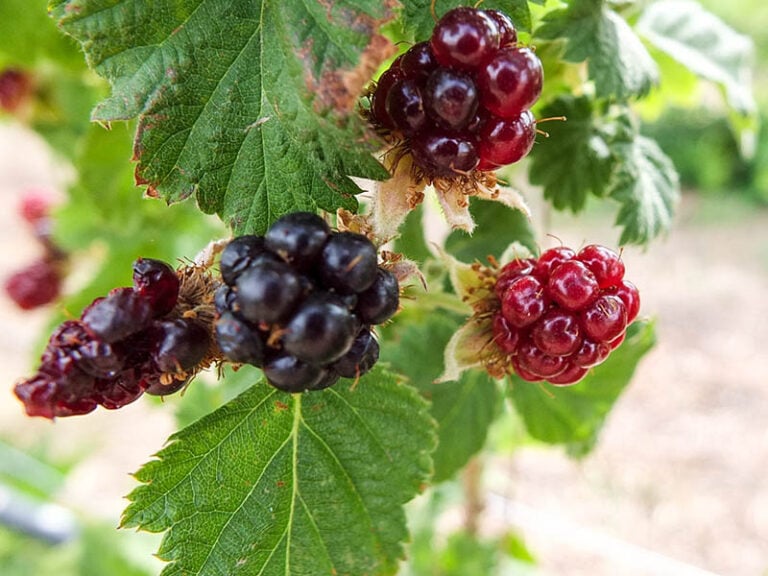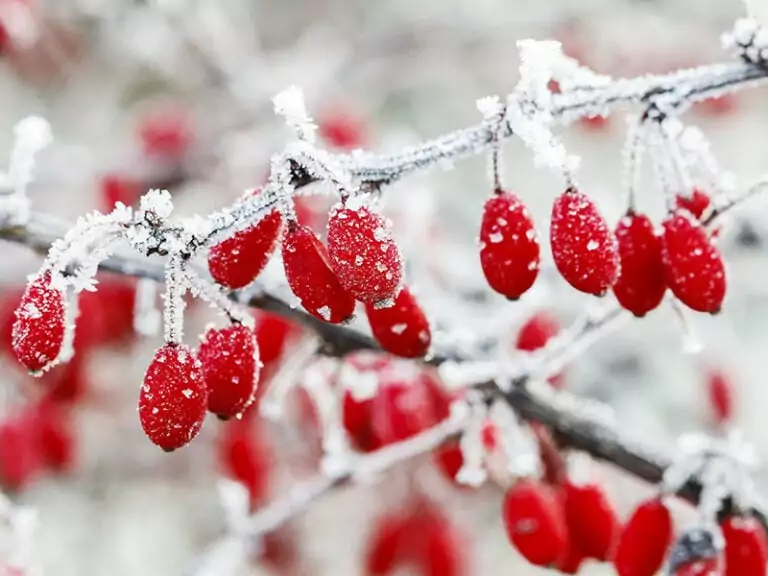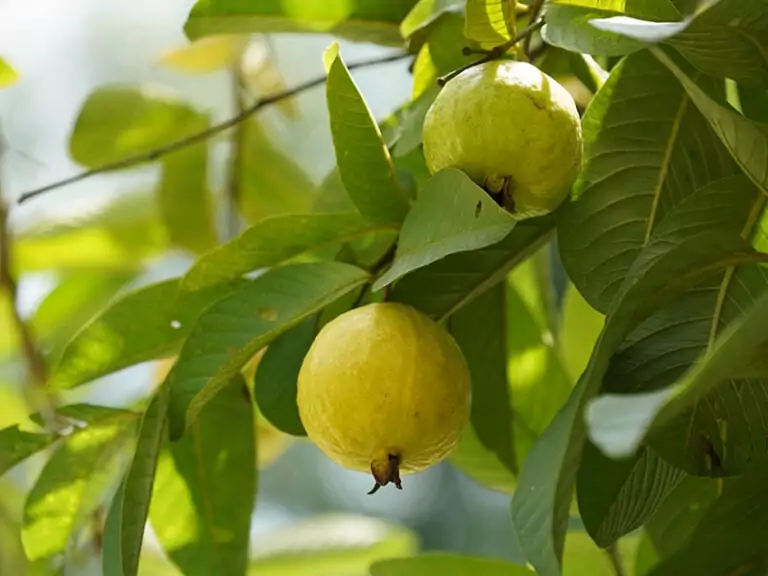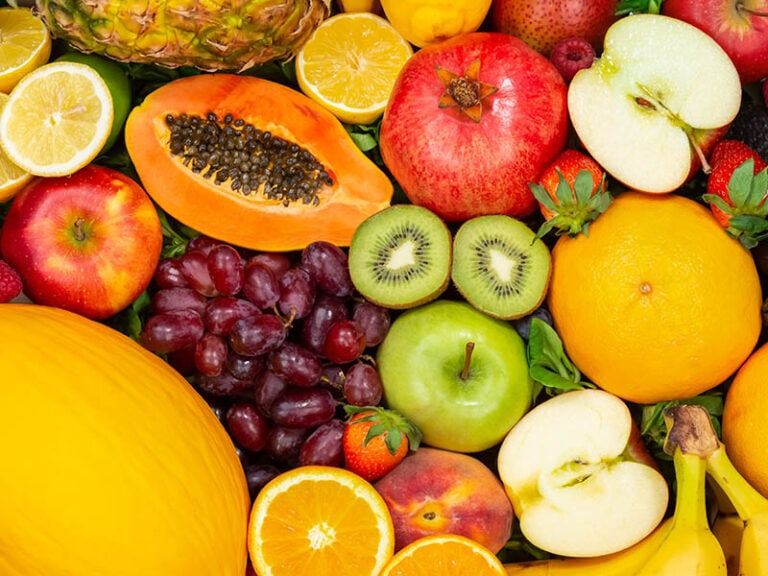It is reasonable to want to know how long does fruit last in the fridge since different fruit has different properties and shelf life. Some last for a long time but some seem to be easily spoiled even though you have carefully stored them.
Maybe you are planning to fill your fridge with fruit on your next trip to the grocery store to add more fiber to your diet. However, there remains a question of how much you will be able to consume before they go bad.
Before selecting and putting them in your cart, consult this article to equip yourself with the necessary information. Your next batches of fruit will stay fresh and tasty for a long time in the fridge!
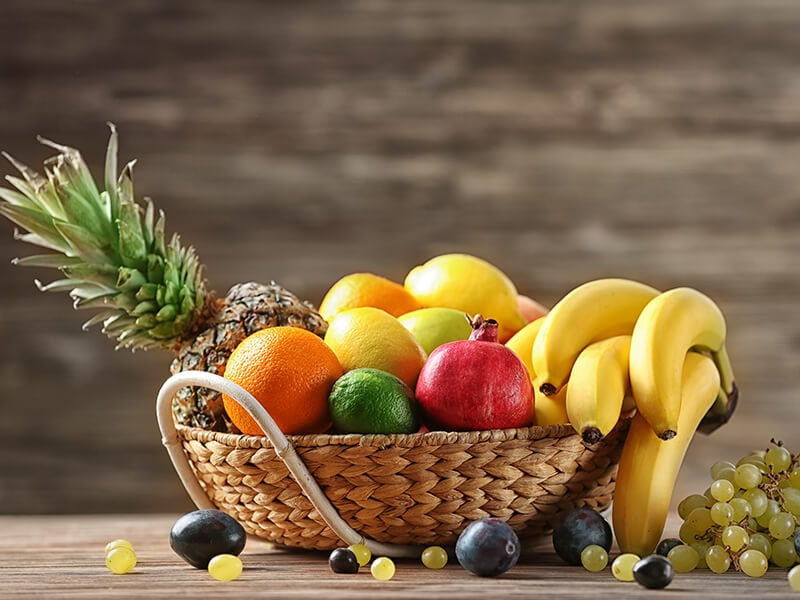
Types Of Fruit And Their Shelf-Life
There are many types of fruit that you can spot when cruising through the aisles of the supermarket. Each of them has different properties that determine how long they can stay fresh during the storing process.
The harvesting, transporting, and preserving processes also have an impact on the shelf life of the fruit. In this section of the article, I will cover different categories of fruit and point out how long each of them usually lasts.
Berries
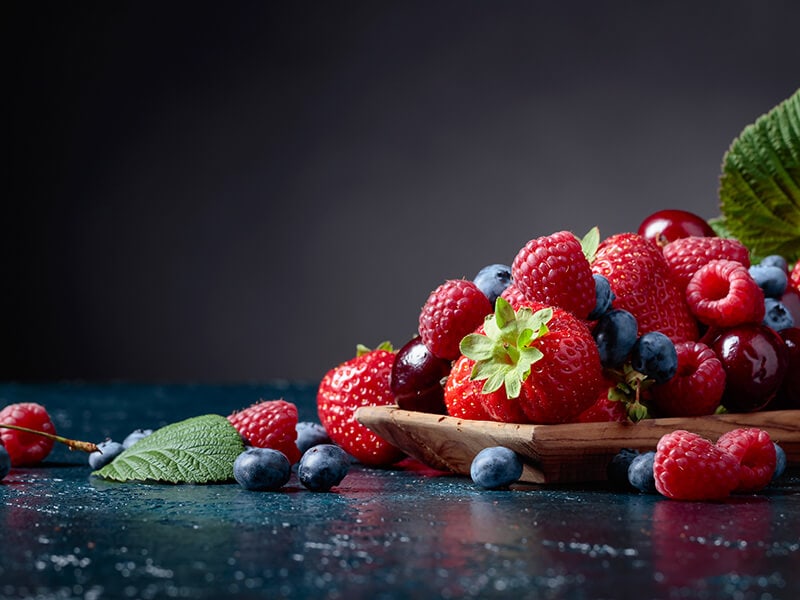
Berries are often small and pulpy, they can be juicy, bright in color, and sweet (or sour, tart) in taste. These fruits don’t have a stone or pit, but they may have seeds or pips. Some popular berries are raspberries, strawberries, blueberries, and blackberries.
Berries can only be found during their season (from spring through summer) and will last 3 – 7 days after fully mature. Berries will become softened if stored outside, so make sure you give them proper storage in the fridge.
Raspberries will only last from 2 to 3 days due to their extremely thin skin and high juice contents. Strawberries, blueberries, and blackberries can last up to one week in the fridge.
Note: If your berries become soft and discolored, it means they have gone bad and should not be consumed.
Citrus Fruits
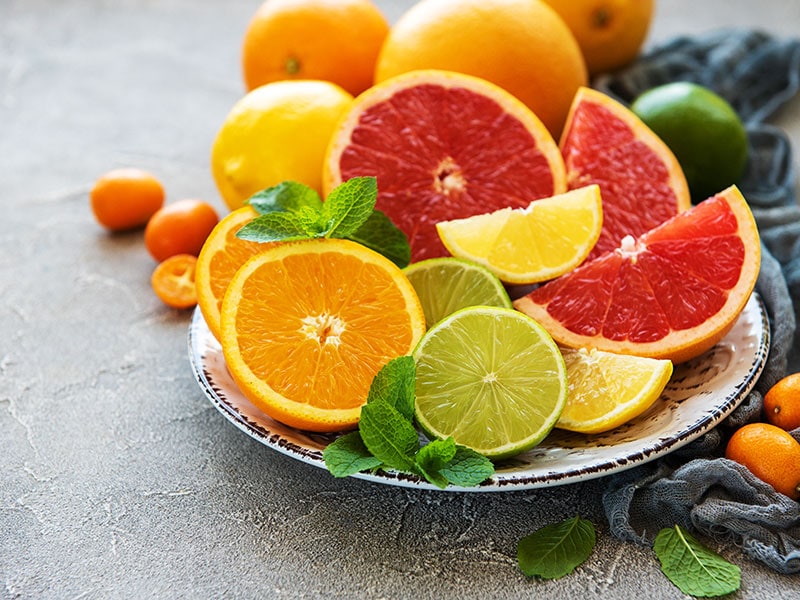
Citrus fruits are fruits that grow on evergreen trees or shrubs. Their skins are thick and must be removed before consumption. They have pulpy flesh that is divided into segments. Some commonly known citrus fruits are oranges, limes, lemons, grapefruits, and pomelos.
After being plucked from the tree, citrus fruit can only last from 3 to 4 weeks at room temperature. After harvesting, they will be cooled to stop them from being fully ripe. Then they will be transported to the stores, where they can stay fresh for 2 to 3 months.
When you buy and store them, thanks to their thick skins, citrus fruits can last very long in the fridge, up to 3 or 4 weeks. Refrigerating also helps prevent them from drying out. When citrus fruits expire, the skin will become dehydrated and turn brown.
Note: To check if citrus fruits have gone off, check the skin color and push into the skin and feel if the flesh is too soft and does not bounce back. If so, the fruit has been too ripe. On the other hand, white mold does not indicate they have gone sour, you can simply wipe it clean.
Drupes
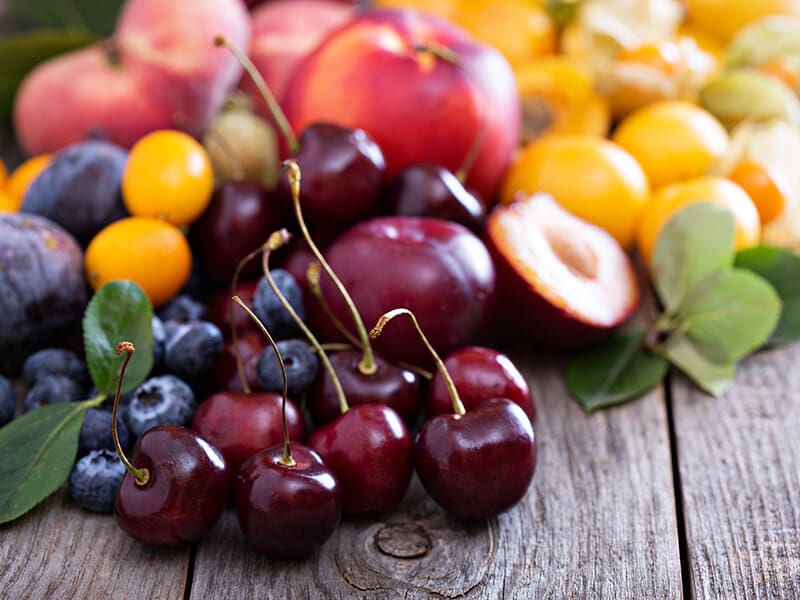
Drupes (also known as Stone fruits) are fruits that develop from a single seed. Protecting the seed is a hard shell, and surrounding that shell is succulent flesh and soft peels.
Drupes include a lot of fruits, but to make it simple, I will only put apricots, plums, peaches, and nectarines in this category. Cherries and avocados can also be considered stone fruits.
Drupes can ripe rapidly, so they have to be transported to store shortly after being packaged and stored. Depending on the variation, they can have different life spans in the refrigerator.
Peaches, nectarines, and plums can stay fresh for 5 days maximum and 3 if they have been cut. Apricots can last longer in refrigerated condition, up to 7 to 10 days.
Note: To check if the fruit has been too ripe, simply press into the flesh and see if it leaves an indent.
Melons
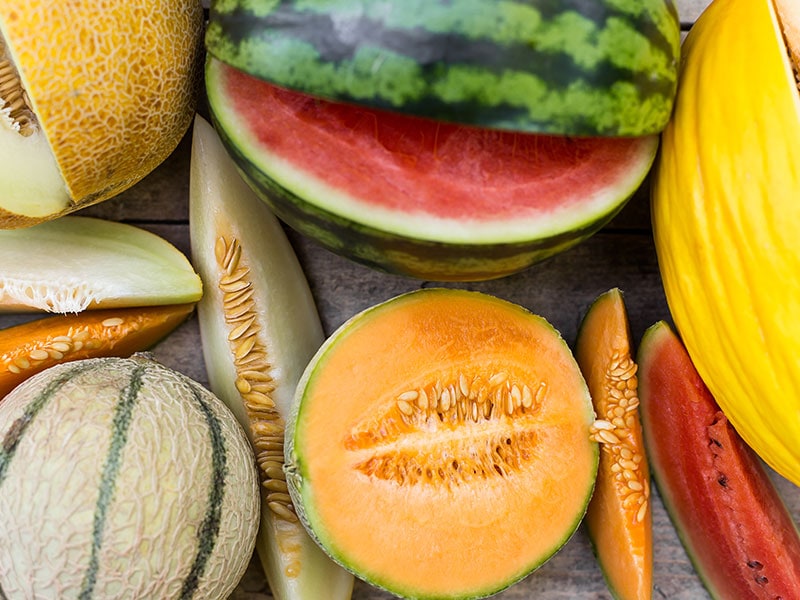
You can spot melons from far away with their distinctive thick skin and round or elongate appearance. Underneath those chunky layers is firm, juicy, and sweet flesh. They are much larger than all the fruits mentioned in this section.
Some melons you may know are watermelon, winter melon, cantaloupe, canary melons, and honeydews. The exact shelf life can vary depending on the size, coloration, and how they were cultivated.
Due to their thick skin, melons receive a natural layer of protection from the elements. In the fridge, they will last about 1 to 2 weeks. This number is 10 days for cantaloupes and honeydews.
But not all fridges are large enough to accommodate their size, so normally they will have to be cut into smaller parts. Once cut, they will last from 4 to 7 days.
Note: If your melon becomes dry and gritty, the peel turns soft and discolored, it means the melon has passed its prime and should not be consumed.
Pomes
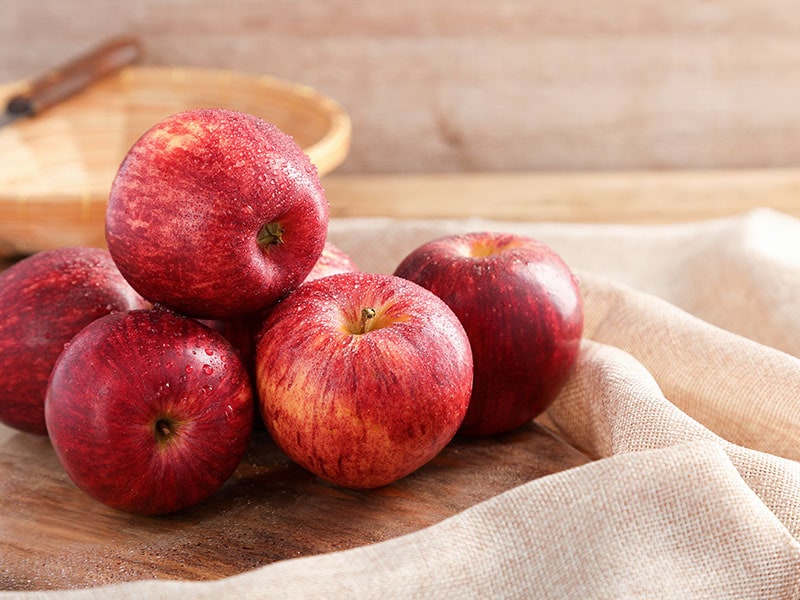
Pomes refer to fruits that come from flowering plants. They can be recognized through their seed-filled core that is surrounded by flesh. Apples, pears, kiwis, and quinces are some of the fruits that are categorized as pomes.
There are a lot of factors that could influence their longevity, namely the storage condition and the time they were collected.
Apples can last up to 6 to 8 weeks in the fridge in the best condition. Before hitting the shelves, they were kept in refrigerated storage for 2 to 12 months. This step helps slow down the maturing process of apples.
Pears don’t last as long as their cousin because they ripen rapidly after being plucked from the tree, they can only stay fresh for 5 – 7 days.
Note: Signs that show a pome fruit is no longer fresh include: the flesh becomes soft and grainy, the skin becomes wrinkled and discolored. If you spot any mold on it, you should not consume it.
Tropical Fruits

Tropical fruits come from high-temperature regions of the world. These fruits are not categorized for their similarity in appearance or structure. In fact, they look and taste very different from one another. Consequently, their shelf life will also differ.
Some of the more popular tropical fruits are bananas, passionfruit, mangoes, pineapple, dragon fruits, lychees, and even more. One extreme example is the infamous durian, known for its scent resembling that of rotten onions or sewages.
Fully ripe bananas will last 5 to 7 days, pineapples 5 to 6, and mangoes will stay fresh for 1 to 2 weeks depending on the thickness of the skin. Passion fruit can last from up to 1 week, depending on how ripe they are.
Note: To see if your tropical fruits have gone off, simply check for the blemishes on the skin and the softness of the flesh.
The Ultimate Longevity Chart Of Fruits
There are still a lot more fruits that have not been mentioned above. For that, I have one table to make sure that you will find the exact number of how long you should store them.
Note that this table only provides the general guideline for how long you should store each fruit. It has not factored in other things that could affect their life span. It is best that you rely on the signs mentioned above to tell when you should discard them.
What Impacts The Shelf-Life Of Fruit
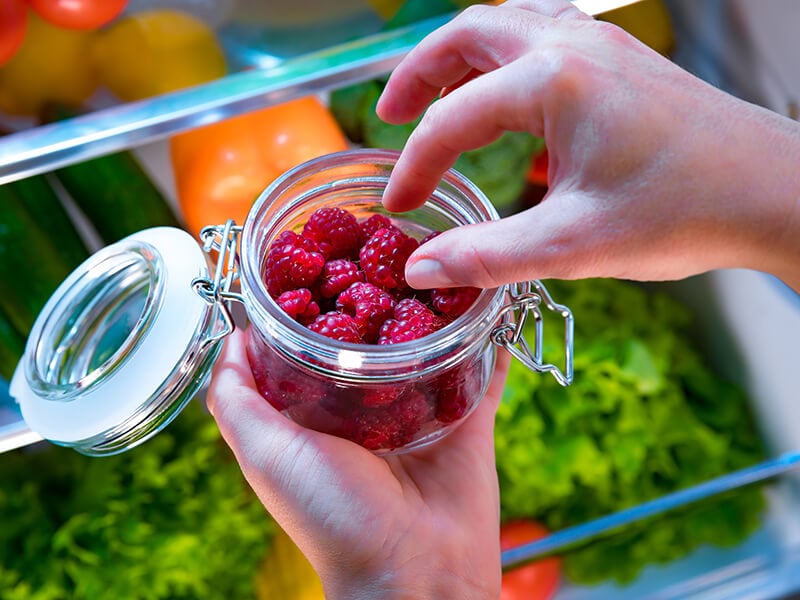
Now that I have covered the question of how long fruit lasts in the fridge, I will move on to discover the factors behind the longevity of each type of fruit. Some of them come from the natural attributes of each fruit, some are outside elements.
Moisture Content
Moisture content can affect the fruit’s appearance, texture, taste, and more importantly, its shelf life and how long it can stay fresh. Fruit with less water content tends to last longer and fruit with more water content will go off faster. (1)
This is due to the increased rate of microbial growth in moist conditions, which leads to a faster rate of spoilage in fruit with higher moisture content.
To combat this, there are methods that aim to prolong the shelf life by drawing moisture out of the fruit or using preservatives.
Age
The older the fruit, the less time it can stay fresh on the shelf. Fruits are often harvested before they are fully ripe and stored in low-temperature conditions to hamper the maturing process. When they are transported to stores, the aging process continues to happen rapidly.
Storage
As mentioned above, fruits are often stored in refrigerated conditions before being shipped to stores and supermarkets. This step can affect the overall shelf life of fruit considering the temperature fluctuation and how long they are stored.
How Refrigeration Helps Prolong Fruit Freshness
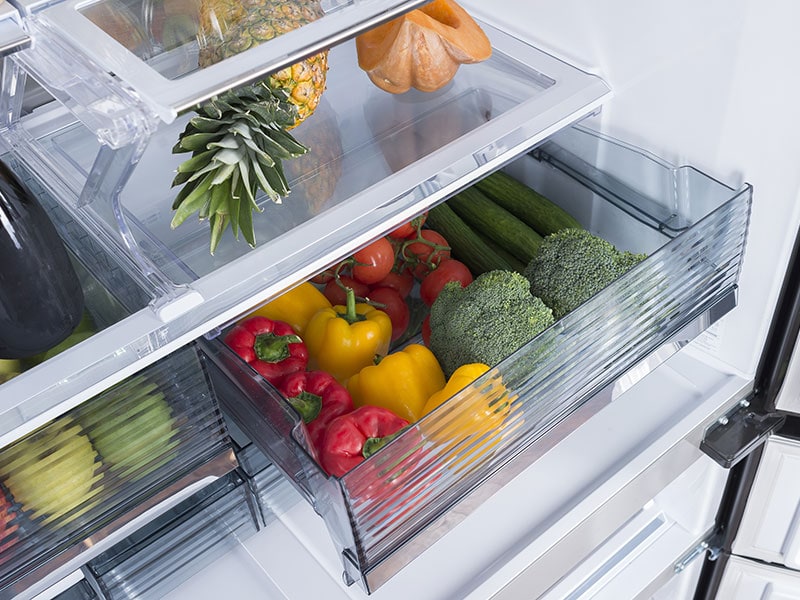
It is common knowledge that fruit and food, in general, will last longer in the fridge than when left at room temperature. But have you ever wondered why refrigeration makes them last longer?
It Discourages Microorganisms Growth
Refrigeration lowers the temperature, this is the key to keeping food last longer than it normally would. It deters the growth of microorganisms by creating an unsuitable environment for them to exist.
The bacteria that often take part in the digestion and decomposition of organic matter are mesophiles and prefer life at temperatures from 20 to 45 degrees Celsius (room temperature is 37), at this condition, they will be able to grow and multiply rapidly. (2)
In the fridge, however, the temperature is often set at 4 degrees Celsius, which is not the ideal climate for bacteria to function properly, thus lowering their growth rate significantly. But remember that it is only slowed, not entirely halted.
It Slows Down The Ripening Process
Low temperatures decelerate enzymatic activity and other biological processes that take part in making the fruit ripe. These enzymes are responsible for breaking the cell walls of fruit and making them softer. This process will be in effect until the fruit is rotten.
By putting your fruit in the fridge, you are preventing the natural occurrence of decomposing from happening too fast.
Tips For Longer Lasting Fruits
It is established that keeping fruits in the fridge will help them last longer, but each individual fruit on the shelves will have a different amount of time left for them. To have the longest-lasting fruit, you must first select the freshest one, then prepare and store them appropriately.
Select Fresh Products
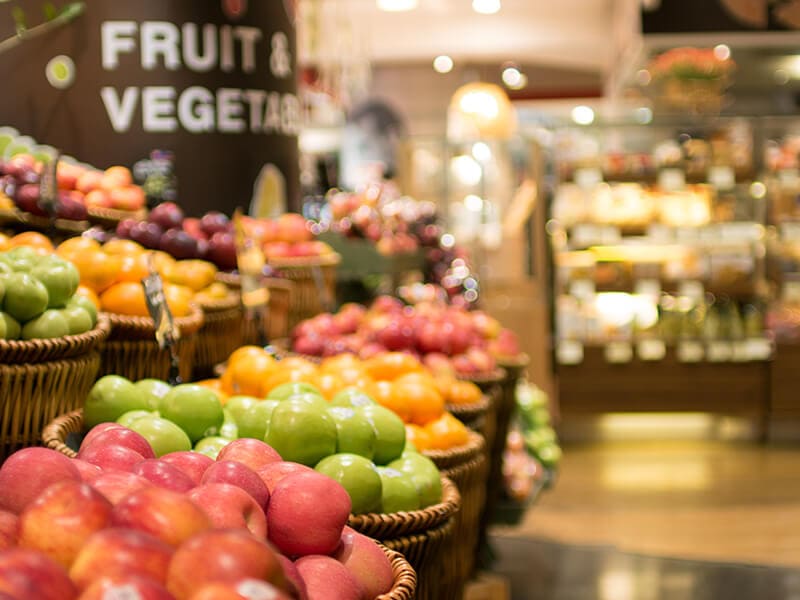
There are a lot of ways to tell if it is still fresh or about to pass its prime. One way to know is to look at the label, if the packaging date is recent and the expiration date is far away, then you can rest assured that your fruit is fresh.
However, not every fruit is packaged and labeled. In this case, you must rely on your senses and judge them in accordance with these criteria:
Coloration
The color of the fruit changes as they ripen. Typically, they will change from green to the color you associate them with (for example, bananas change from green to yellow as they are ripe).
To pick the freshest ones possible, you should look for those that are not fully ripe and avoid the over-ripened ones (unless you are planning to consume them right away).
Weight
Some fruit such as oranges, melons, and pineapples accumulate weight as they are ripe due to the increase in juice content. If the fruit feels too light for its size, then it is not fully ripened, and vice versa.
Odor And Firmness
Most fruits give off their distinctive odor when they are ripe. If they are overripe, the scent will turn vinegary.
Firmness decreases as the fruit matures. Fruits that feel too firm when pressed against are not yet ripe, and fruits that are too soft means they have been on the shelves for quite a while. You should pick the ones that are still on their way to ripening to maximize their time in the fridge.
Wash (Or Not Wash) And Store Them The Right Way
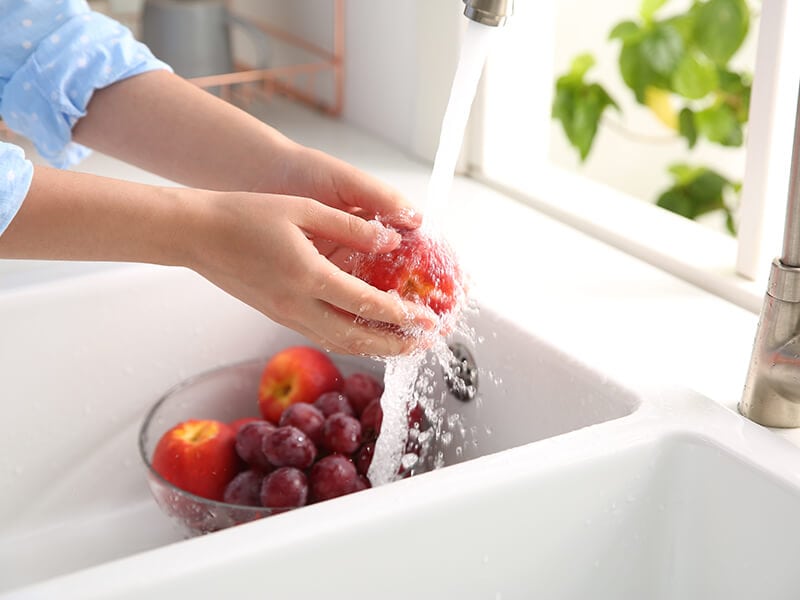
After bringing them home from the store, you should wash them to remove any dirt or residues. However, washing will add moisture to your fruit which will speed up the decaying process. In most cases, it is best that you only wash fruits when you are planning to eat them right after.
For berries, washing them in vinegar solution can actually prolong their shelf life. Vinegar removes any mold that may develop and spoil the fruit. Here is a step-by-step guide to washing and storing your fruit to ensure maximum preserving time.
- Step 1: Soak your fruits in a bowl of water with ¼ cup of vinegar for about 5 to 10 minutes.
- Step 2: Rinse them thoroughly to remove stubborn residue and vinegar.
- Step 3: Spread them out evenly on a clean towel and let them air dry. This step is important because you need to minimize the moisture before storing.
- Step 4: When they are almost dry, put them in an air-tight container and store it in the fridge (The container should be cleaned prior to that)
Discover more tips to keep your fruits fresh longer.
What To Do With Overripe Fruit
Even if you have picked the freshest fruits available and washed them thoroughly before storing them in the fridge, there are bound to be some overripe ones that just don’t taste as good. Before discarding them, you may want to repurpose them to reduce any waste.
Here are a few things you can do with fruits that have been overripe:
Use Them To Ripen Other Fruits
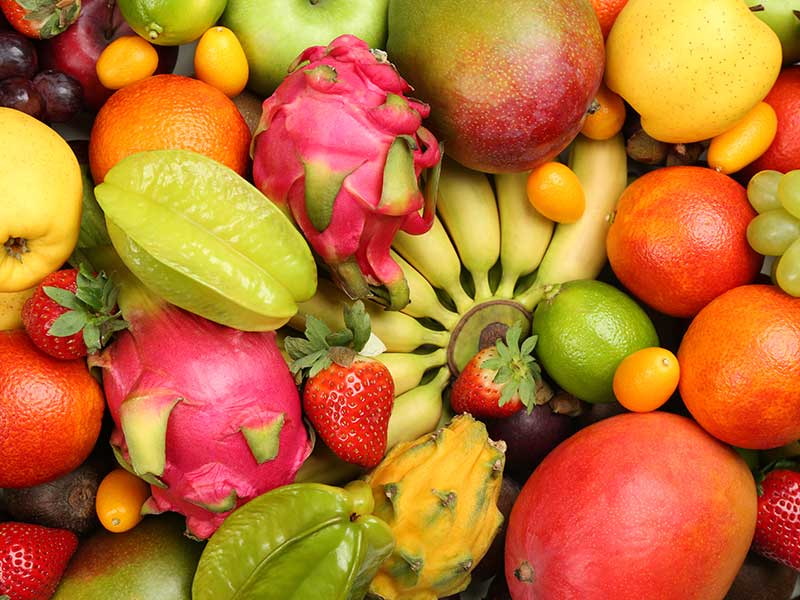
Some fruits such as bananas, apples, apricots, and mangoes,… produce ethylene as they ripen. This hormone accelerates the ripening process even more. Therefore, you can put one overripe fruit together with other green fruits of the same type to make them mature faster.
Make Smoothies
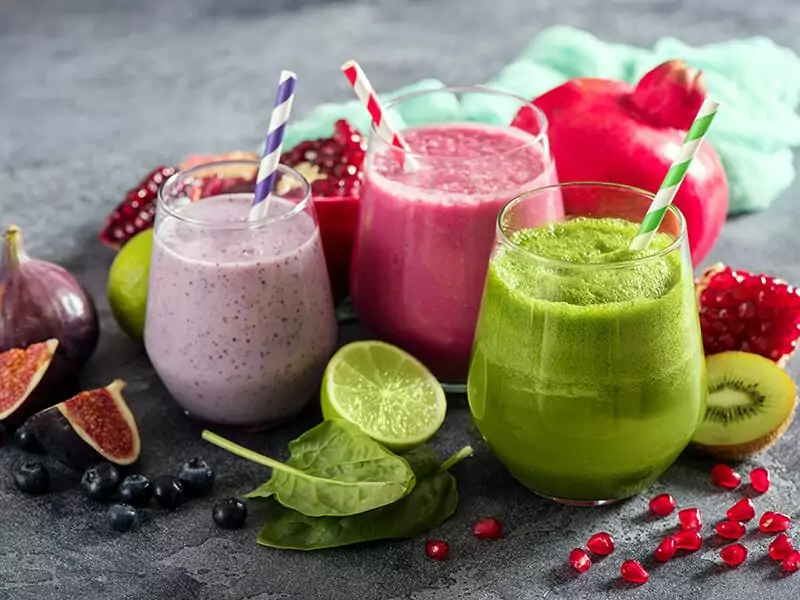
As long as your fruits are not completely rotten, you can always blend them up and enjoy the tastiness they have to offer.
Since they are already naturally sweet, you don’t have to add any sugar or artificial sweetener to the blend. Pour in some milk and ice and what comes out of the blender will be a delicious cup of smoothies for you to enjoy.
Make Jam
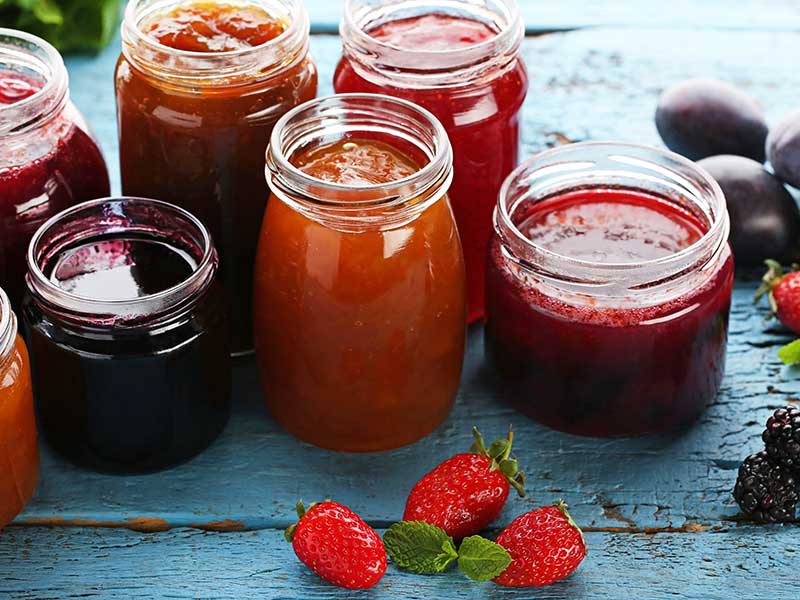
One creative way to use your overripe fruit is to turn them into jam. You can go with apples, plums, strawberries or experiment with less common jam-making fruits.
You need to give them a wash and then chop them into small pieces. Put those freshly chopped bits into a pot, add sugar and water, then cook the mix on low heat. Stir it occasionally until it reaches a desirable consistency.
Make Fruit-Infused Water
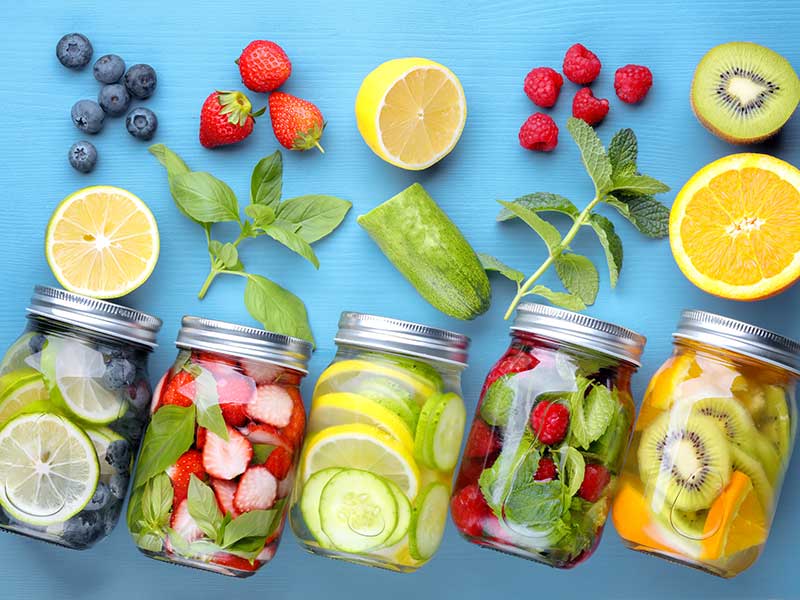
Fruit-infused water is one fun way to flavor up your hydrating game. All you need is water, the fruits of your choice, and a good container (and a fridge). Simply put the chopped fruits into the container, muddle them before adding water and close the lid.
Ideally, fruit-infused water should be made with fresh fruit to ensure the best taste and flavors. But I have tried doing it with overripe fruit and they are palatable, just know that they will not last as long and you should not leave the fruits in the water for too long.
Turn Rotten Fruit Into Natural Fertilizer
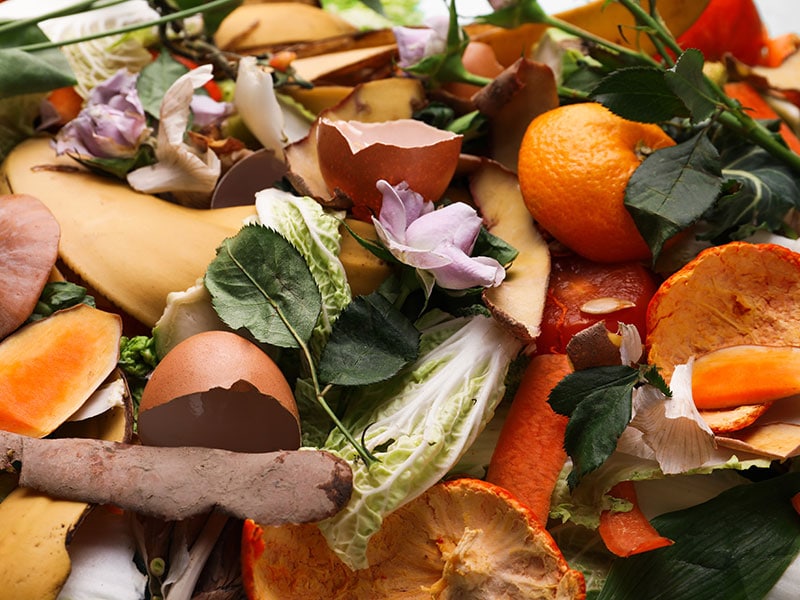
Decomposition is a natural course of all organic life. When your fruits have come to this part, instead of regretfully putting them to the bin, you can give them to your plants as fertilizer.
This is the easiest way to repurpose your fruit as organic fertilizer. Simply bury them 6 inches deep into the soil and let nature take its course. This way, the decomposition process will happen quite slowly so you need to be patient.
And remember, refrain from using rotten fruits that have been infected with insects or bugs if you don’t want them to infect your plant or the entire garden!
Learn more ways to turn fruit waste into plants’ food.
FAQs
Here are a few more questions that you might have about the fruity affair:
Keep Your Fruit Fresh And Healthy To Eat
All fruits are organic and they will eventually succumb to the course of nature and rot. Refrigeration helps a lot in prolonging the life span of food, but it can not do it forever. There will come a time when you have to clean out leftovers and throw them away.
I hope that with this article, you will be able to plan ahead all the knowledge you have accrued. The next time you go shopping for fruit, you will be able to pick them with the right quantity and quality so that they will last the longest possible in your refrigerator.
If you think that this article is useful, please spread it to others and let them know of this information. Feel free to comment below the opinions or questions you may have!
Reference
- Moore, S. (2020, March 25). Why is Moisture Content Analysis of Food Important? News Medical.
- Schiraldi, C., De Rosa, M. (2014). Mesophilic Organisms. In: Drioli, E., Giorno, L. (eds) Encyclopedia of Membranes.

